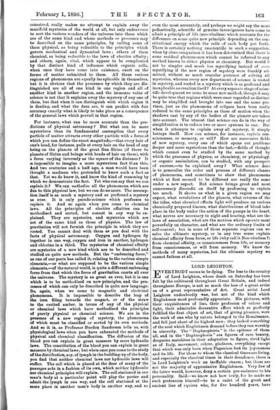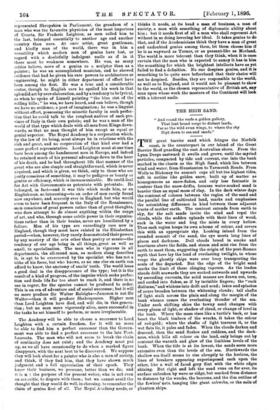sEdeIyGdi dying. - L1VERYBODY seems to The loss to the country
of Lord Leighton, whose oil' Saturday has been felt by the cultivated throughout Great Britain, and indeed throughout Europe, is not so much the loss of a great artist as of a great representative of Art. Great artist Lord Leighton undoubtedly was, but not of the kind which Englishmen most profoundly appreciate. His pictures, with their exquisiteness of line, their profusion of colour and light, their admirable decorative effect which so perfectly fulfilled the first object of art, that of giving pleasure, were the work of one who by nature belonged to the Renaissance, and fell just short of its highest men ; they lacked something of the soul which Englishmen demand before they can worship in sincerity. The " Daphnephoria" is the epitome of them all, and in the " Daphnephoria" are figures of rare beauty, draperies matchless in their adaptation to figure, vivid light as of Italy, movement, colour, gladness, everything except that which was only born when Paganism lost its joyousness and its life. For those to whom the classical times are living, and especially the classical times in their decadence, there is in Lord Leighton's work an ineffable charm ; but those are not the majority of appreciative Englishmen. Very few of the latter would, however, deny a certain pre-eminence to his personality. Said—we know not how truly, for he made no such pretension himself—to be a cadet of the great and ancient line of squires who, for five hundred years, have represented Shropshire in Parliament, the grandson of a man who was the favourite physician of the most imperious of Courts, Sir Frederic Leighton, as men called him to the last, belonged essentially to another age and another country than ours. At once artist, great gentleman, and kindly man of the world, there was in him a versatility which modern men of genius have lost, or regard with a doubtfully indulgent smile as if in it there must be weakness somewhere. He was, as many critics believe, more of a genius as a sculptor than as a painter ; he was an accomplished musician, and he showed evidence that had he given his rare powers to architecture or engineering, he might in either department of effort have been among the first. He was a tree and a considerable orator, though to English ears he spoiled his work in that splendid art by over-elaboration, and by a tendency to be lyrical, as when he spoke of Linnell painting "the blue riot of the rolling bills ; " he was, we have heard, and can believe, though we have no evidence, a poet of imagination; he was a linguist without effort, possessing the mimetic faculty in such perfec- tion that he could talk to the roughest natives of each pro- vince of Italy in their own patois; and he was a man of the world of that type which deals with all men from Kings down- wards, so that no man thought of him except as equal or genial superior. The Royal Academy is a corporation which, by the law of its being, must always be in relations with the rich and great, and no corporation of that kind ever had a more perfect representative. Lord Leighton must at one time have been among the handsomest men in Europe, and indeed he retained much of his personal advantage down to the hour of his death, and he had throughout life that manner of the great who are also simple and straightforward, which is never acquired, and which is given, we think, only to those who are justly conscious of something, it may be pedigree or beauty or genius or efficiency, which is incommunicable. He could deal for Art with Governments as potentate with potentate. He belonged, in fact—and it was this which made him, as an Englishman, so interesting—to an order of men rarely found now anywhere, and scarcely ever in England, but who would seem to have been frequent in the Italy of the Renaissance, .men conscious of great powers rather than of great thoughts, who dare attempt to do almost anything within the range of art, and who, through some subtle power in their organisa- tions rather than in their brains, never are humiliated by a failure. Men of his type are exceedingly rare now in England, though they must have existed in the Elizabethan period—when, however, they rarely demonstrated their powers by any mastery of the arts other than poetry or music—the tendency of our age being in all things, great as well as small, to specialisation. The man who is vigorous in all departments, the all-round man, as modern slang describes it, is apt to be overerowed by the specialist who has not a tithe of his force, but who knows, as no one else on earth can afford to know, the anatomy of snails' teeth. The world loses a good deal in the disappearance of the type ; but it is the result of a kind of progress, of the impulse which seeks perfec- tion and finds life far too short to reach it, and there is no use in regret, for the species cannot be produced to order. This is an era of adventure and of social successes ; but it will no more produce Sir Walter Raleighs—Jameson is not Sir Walter—than it will produce Shakespeares. Higher men than Lord Leighton have died, and will die, in this genera- tion; but no man more vigorously alive, more successful in the tasks he set himself to perform, or more irreplaceable.
The Academy will be able to choose a successor to Lord Leighton with a certain freedom, for it will no more be able to find him a perfect successor than the Govern- ment was able to find a perfect successor to the late Poet- Laureate. The man who will not seem to break the chain of continuity does not exist ; and the Academy must put up, as we all have occasionally to do when a marked figure disappears, with the next best to be discovered. We suppose they will look about for a painter who is also a man of society, and think, if they find him, that they have shown much judgment and a full appreciation of their epoch. They know their business, we presume, better than we do; and it is n t the purpose of the present writer, who is not even an at t-critic, to dispute with them ; but we cannot avoid the thought that they would do well, in choosing. to remember the claim of genius first of all. The Royal Academy needs, or thinks it needs, at its head a man of business, a man of society, a man with something of diplomatic ability about him ; but it needs first of all a man who shall represent Art without in so doing lowering her ideal. It takes genius to do that, and if the Academicians think they have a man of great and undoubted genius among them, let them choose him if he is as wayward as Turner, or as peasant-like as Morland. The world is more tolerant than they think, when it is ones certain that the man who is expected to annoy it has in him the something for which the brightest intellects have as yet failed to find a definition. No one despises genius, and it is something to be quite sure beforehand that their choice will not be despised. Besides, they are responsible to the world, as well as to England, and it would not be pleasant to show to the world, as the chosen representative of British art, any man upon whose work the masters of the Continent will look with a tolerant smile.







































 Previous page
Previous page